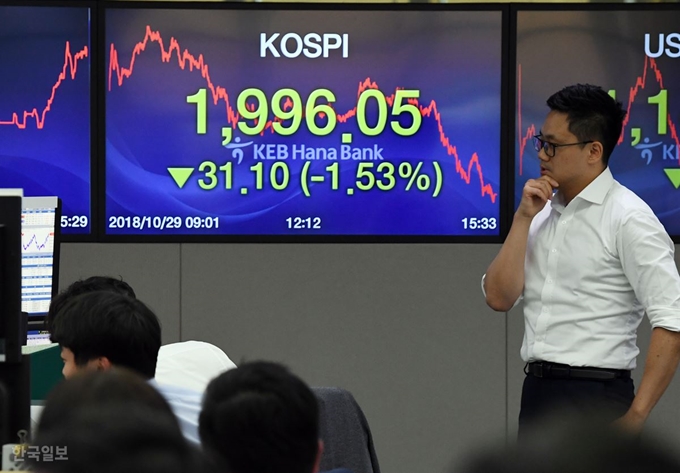
<10월 30일자 코리아타임스 사설>
It is urgent to improve economic fundamentals
경제 펀더멘털 개선이 시급하다
The government has come up with a plan to set up an investment fund worth 500 billion won ($438.4 million) to stabilize local stock markets. The plan came Monday after the markets continued to tumble this month.
정부는 주식 시장 안정을 위해 5,000억원(4억3,840만 달러) 상당의 투자 펀드 조성 계획을 수립했다. 이 계획은 이번 달에 시장이 계속 폭락한 후 월요일에 나왔다.
Yet no one can be sure that the creation of the fund is good enough to stem the slide of share prices. Investors snubbed the plan as the benchmark Korea Composite Stock Price Index (KOSPI) dropped by 1.53 percent to 1,996.05 points. It marked the first time in 22 months that the index fell below the 2,000-point mark. The tech-heavy Kosdaq market was far worse because it lost 5.3 percent.
그러나 누구도 이 펀드 조성이 주가 하락을 막기에 충분하다고 확신할 수가 없다. 투자자들은 종합주가지수 KOSPI가 1.53% 하락 1,996.05포인트까지 밀리자 이 펀드 조성 계획을 무시해 버렸다. 주가지수가 2,000포인트 밑으로 하락한 것은 22개월 만에 처음이다. 기술주 중심의 코스닥시장은 5.3% 하락해 훨씬 더 심각했다.
The downward march could be attributed to the global equity market volatility amid an escalating trade war between Washington and Beijing and higher interest rates in the U.S. Although these external factors are taken into consideration, Korea’s market turbulence is surprising as its share prices dropped more steeply and faster than any other exchanges around the world.
이번 중시 하락 행진은 미-중 무역 전쟁이 고조되고 미국의 금리가 인상되는 가운데 세계 주식시장의 변동성에 기인한다고 할 수 있다. 대외 요인을 고려한다 하더라도, 한국 시장의 폭락 사태는 세계 다른 여타 국가의 주식 시장보다 더 가파르고 빠르게 하락했기에 놀라운 것이다.
This explains why the financial authorities should make all-out efforts to regain market stability. Throughout this month the KOSPI lost about 15 percent and the Kosdaq index nosedived nearly 25 percent. Worse, the markets are feared to go on a downward spiral because pessimism prevails over stock investment.
이는 금융 당국이 시장 안정을 회복하기 위해 혼신의 노력을 다해야 하는 이유이다. 이번 한달 동안 KOSPI는 15%, 코스닥 지수는 거의 25%나 하락했다. 더 심각한 것은 주식 투자에 대해 비관론이 우세해 하락장세가 지속될 것으로 우려된다는 것이다.
In this sense, the planned establishment of the investment fund is seen only as an expedient measure. How can the government bring the turmoil under control by injecting a meager 500 billion won into the local bourses? It is as if policymakers are trying to show they are doing something in order to avoid any criticism for doing nothing in the face of a looming crisis.
이런 의미에서, 투자 펀드의 조성은 임시 방편에 불과한 것으로 보여진다. 정부는 주식 시장에 5,000억원에 불과한 적은 금액을 투입하여 어떻게 시장 대혼란을 진정시킬 수가 있을까? 이는 정책입안자들이 다가오는 위기에 직면하여 아무것도 하지 않고 있다는 비난을 피하기 위해 어떤 일을 하고 있다는 것을 보여주기 위한 것처럼 보인다.
Few believe such a measure will work, considering foreign investors’ selling streak. Net selling of Korean stocks by foreign investors has stood at 6.7 trillion won so far this year. Their “sell Korea” spree was evident in October by dumping more than 4.5 trillion won. In the bond market, foreigners have also become sellers since last month although the amount was not big enough to cause concern.
투자자들의 매도 행진을 고려할 때, 이러한 방안이 성공하리라고 생각하는 사람은 거의 없다. 외국인 투자자들의 한국주식 순매도금액은 올해 현재까지 6조7,000억원에 달한다. 그들의 ‘셀 코리아’ 행진은 4조5,000억원 이상 투매한 10월에 두드러졌다. 채권시장에서 또한 외국인들은, 비록 우려할 만한 금액은 아니지만 지난달 이래 순매도로 전환했다.
Now, we have to look at why foreign investors are selling local stocks. The answer is simply: The Korean stock markets are losing their attractiveness. Most of all, listed companies are reporting worse-than-expected performances. This means they continue to lose their profitability in the face of rising labor and other production costs and falling competitiveness in terms of price and quality.
이제, 우리는 외국인 투자자들이 왜 국내 주식을 매도하고 있는지를 살펴보아야 한다. 그 이유는 간단한데, 한국 주식시장이 매력을 잃어가고 있는 것이다. 무엇보다도, 상장 회사들의 실적이 예상보다 부진하다. 이는 회사들이 인건비와 기타 생산비 상승, 그리고 가격 및 품질 경쟁력 하락에 직면하여 수익성이 계속 떨어지고 있다는 것을 의미한다.
To add insult to injury, the Korean economy is rapidly losing steam. Economic research institutes at home and abroad have continued to revise down the nation’s economic growth projection for this year and the next. It seems difficult for the government to meet its growth target of 2.9 percent.
설상가상으로, 한국 경제는 빠르게 활력을 잃어가고 있다. 국내외 경제 연구소들은 올해와 내년도 한국 경제의 성장 전망치를 계속 하향 조정해 왔다. 정부가 2.9%의 성장 목표치를 달성하는 것은 어려울 것으로 보인다.
Now it is urgent for the authorities to take more radical measures to regain investor confidence. This is easier said than done. But the Moon administration should do its best to make the local markets attractive again by improving economic fundamentals, pushing for structural reforms and helping corporations hone their competitiveness.
이제 당국은 투자자들의 신뢰를 회복하는 것이 시급하다. 이는 말은 쉽지만 이행하기는 어렵다. 그러나 문재인 정부는 경제 펀더멘털 개선, 구조 개혁 추진, 기업 경쟁력 제고를 통해 국내 시장을 다시 매력적인 시장으로 만들기 위해 최선을 다해야 한다.
안성진 코리아타임스 어학연구소 책임연구원
기사 URL이 복사되었습니다.

댓글0